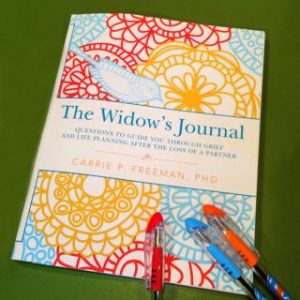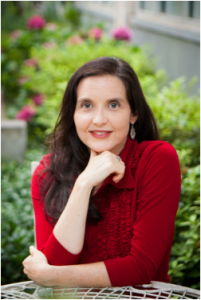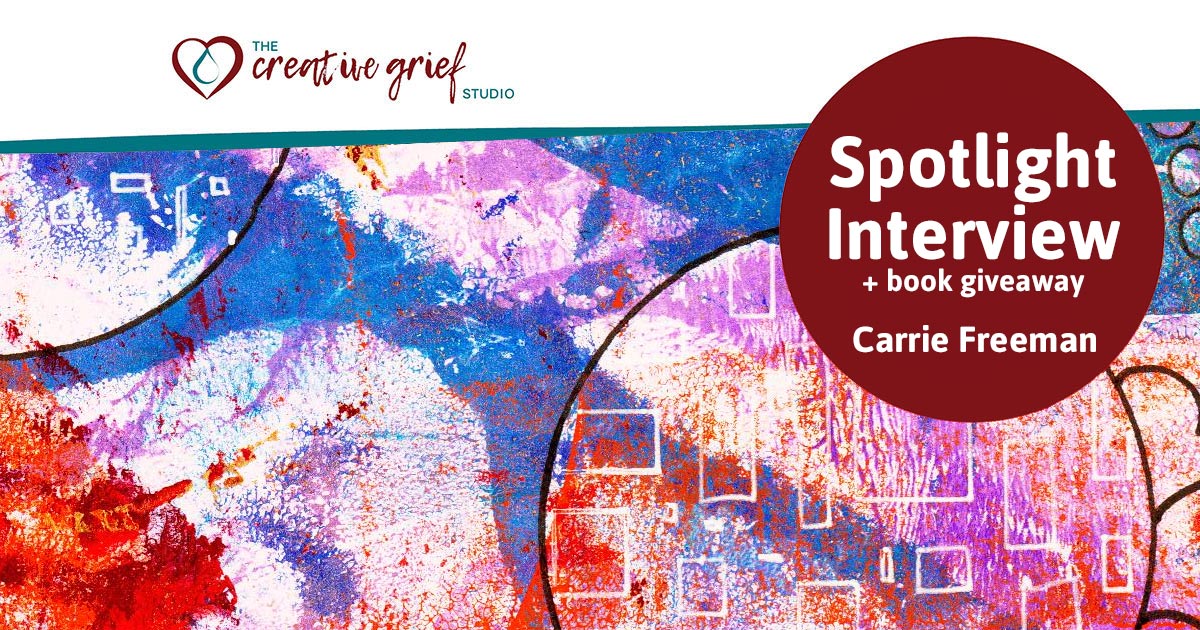
Giveaway: The Widow’s Journal
NOTE: This giveaway is now closed and winner has been announced. Thanks everyone!
We have one copy of Carrie’s book “The Widow’s Journal” for giveaway today. Open to US mailing addresses only. Book will be mailed to winner via USPS. To enter for your chance to win a free copy of “The Widow’s Journal,” email us! Giveaway entries will be accepted from Mar 26, 2018 to April 8, 2018. And then we’ll announce the winner in our eNewsletter on Apr 11, 2018.
The Interview
Author Carrie Freeman is a member of the social support group for widowed people that alumna Tamara Beachum leads in Atlanta, Georgia. Her book The Widow’s Journal is a guided journal, and when Tamara finished it she knew it would be a valuable tool for others experiencing the heartbreak of losing a life partner. Recently, she asked Carrie a few questions about how the book came about.
T: What made you decide to write this book? What were your intentions in creating it?
 C: I started off writing questions and making a hand-written copy for my aunt after she was widowed a few years ago. I wrote a lot in a blank journal, especially when I was grieving, to help me work through my feelings. I designed The Widow’s Journal that I eventually self-published because I wanted something to give to people who lost their spouse, with an emphasis on helping them cope. I noticed that none of the grief books for loss of a spouse were guided journals – something I could have used when I lost my husband to leukemia in 2001. There also weren’t many books open to any religious belief system or the non-religious so I also saw that need.
C: I started off writing questions and making a hand-written copy for my aunt after she was widowed a few years ago. I wrote a lot in a blank journal, especially when I was grieving, to help me work through my feelings. I designed The Widow’s Journal that I eventually self-published because I wanted something to give to people who lost their spouse, with an emphasis on helping them cope. I noticed that none of the grief books for loss of a spouse were guided journals – something I could have used when I lost my husband to leukemia in 2001. There also weren’t many books open to any religious belief system or the non-religious so I also saw that need.
T: What role do you think creativity plays in the grieving process? How did creativity help you?
C: I don’t think I was aware of creativity playing a role until you asked me this question but some of the questions I ask users of the The Widow’s Journal guide them to imagine a new life for themselves. They are encouraged to think years in advance to envision what they want to be doing and feeling. The last section of the book has pages for them to collage images of things that make them happy, make them laugh, make them remember, and make them aspire to create a new life.
T: One of the things I appreciated about your book is that you didn’t try to fit grief into a tidy process like the 5 stages or by encouraging “closure.” Was this on purpose?
C: I don’t claim to be a grief expert so I organized the book around questions about the different types of issues one might naturally encounter in the months following widowhood. How can you adapt to the changes you’ll face in your personal life as time passes? I don’t know how quickly or slowly each person might go through different phases or be willing to face certain realities. That affects when they might want to answer certain questions I pose in the book, so they can look through all the questions and then skip around and answer any that fit their evolving interests. They don’t have to go in any particular order.
T: What did you learn about grief before and during the process of writing the book?
C: Most of what I learned happened during the most acute phases of grief, in the first few years after my husband died. I do have a different perspective now that 15 years have passed – in some ways my perspective on grief as a widow is personal and close but in other ways grief at its most painful is a more distant memory, and I don’t allow myself to relive it very often – I can remember it but I don’t feel it as acutely.
A theme in my book is taking care of yourself and others. I encourage readers to be a caretaker for themselves now that they are grieving and need so much comfort and support, just as they might have spent a lot of time being a caretaker for their dying partner in some cases. I want people to find as many productive ways as they can to cope and get through the day, finding some relief or hope. Part of making yourself feel better may also be by being of service to others when you can, and making the world a better place; so finding ways to make your life meaningful is important. For me, that was continuing my passion of helping to protect animals and the environment.
T: What has the response been to your book?
C: I’m happy that people seem to really appreciate the book (both women and men) and also like how it’s designed with the nature theme. I have an art background and I worked with a local graphic design student to ensure the book would feel good and be pleasant to look at and write in. I wanted it to feel like a sanctuary. I was pleased that the book was honored as a finalist in the grief category of the 2015 Foreword Reviews INDIEFAB Book of the Year Award, a national competition for books published by small or independent publishers.
T: Where can someone buy a copy?
C: People can go through my website at www.thewidowsjournal.com to find the link to buy it on Amazon.
About Carrie
Carrie P. Freeman holds a doctorate in communication and society and works as a tenured associate professor of communication in Atlanta, Georgia. She has authored numerous scholarly publications on ethics, journalism, and social movement advocacy, especially focused on animal and environmental protection. She co-hosts weekly local radio shows on that topic on WRFG (Radio Free Georgia) 89.3FM. Prior to her academic life, she had a human resources career focused on professional development and personal growth training. This experience and her career as a teacher helped her write questions for the book that facilitate people’s learning and development.
Carrie was widowed when her husband, Dave, died from cancer in 2001 when she was 29 years old. She was his caregiver as he went through extensive therapy for bone cancer and eventually developed leukemia, dying in the process of getting a stem cell transplant. Read more about Carrie and Dave here.

